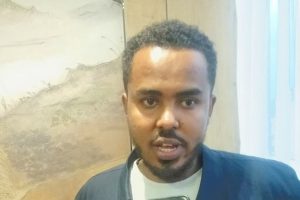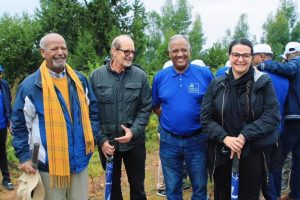
While the prospect of setting up a strong multiparty democracy in Ethiopia is highly dependent on political parties’ culture of dialogue and compromise, identity-based parties approached by The Ethiopia Herald express their willingness and openness to sit and discuss with their counterparts issues of national significance. Leadership members of the Oromo Federalist Congress (OFC), National Movement of Amhara (NAMA) and Tigrians for Democracy and Sovereignty (ARENA) also affirm that they are committed enough to have a say in building strong multiparty system in Ethiopia.
As most scholars’ advice, the weak political culture of dialogue is a hurdle for multiparty democracy as it further polarizes differences. Due to historical circumstances and the existence of huge diversity, Ethiopia adopted a federal system to ensure that the nations, nationalists, and peoples of Ethiopia govern themselves. Subsequently, this has also influenced the formation of political parties to be on the basis of identity. There is significant debate among scholars about the merits of ethnic-based political parties. Citing various prominent scholars, Alefe Abeje, in his article published on European Scientific Journal under the title ‘The Role of the Federal System on the Structure and Operation of Political Parties in Ethiopia’ stated that there are negative and positive outlooks regarding the formation of parties on identity lines and their role for democratic culture.
Critics stressed the strong emotional quality and zero-sum competitive logic associated with identity-based parties. The typical feature of such parties is an electoral strategy to mobilize its ethnic base with exclusive, often polarizing appeals to ethnic group opportunity and threat.
On the other hand, however, other scholars dispute this negative assessment of ethnic parties and maintain that such parties provide opportunities for interest articulation to groups that might otherwise be excluded from the political system. Proponents argue that democracy works best when societal cleavages are recognized as basic to political life. The famous argument of consociationalism is that ethnic parties help diminish conflicts by channeling demands through legal channels, particularly if all significant groups can be represented proportionately in state institutions.
This makes some to wonder about the prospects of the multiparty system in the country. One possible scenario is the one demonstrated by EPRDF. While the four members of EPRDF are formed based on identity lines, Alefe noted that organizationally, the ruling EPRDF is a “front founded by the union of revolutionary democratic organizations” on the basis of “equality”. Member organizations have no separate ideological life. All EPRDF’s four-member organizations are obliged to implement national ‘revolutionary democratic programmes’ in their respective states taking in to account their local conditions and realities.”
On the other hand, the other option seems to be nurturing a well-developed culture of dialogue and compromise.
Gebru Gebere-Mariam, Deputy Chair of the Oromo Federalist Congress and former Member of Parliament and Pan-African parliament tells The Ethiopian Herald that the country is heading towards realizing a multiparty democracy.
“It seems now; there is a fertile ground to democratize this country, at least there are hopes. Therefore, parties need to make their stance clear to the public and they also need to reformulate each other in such a way that they can become a formidable force in the democratization process.”
He also affirms his party’s willingness to work with others. “My party is member of Medrek, the grand opposition coalition,” he says adding “So working with others has not been a problem for us as we are part of the coalition with four members; the Sidama Liberation Front, Union of Tigrians for Democracy and Sovereignty (ARENA) and the Social Democratic Party. So we are trying to strengthen Medrek to become formidable opposition. After this entire bitter struggle in this country, I hope we can do a better job.”
Regarding discussion forums, the Deputy Chair says: “We have been trying to do this before the initiatives of the Prime Minister himself. All the way through, we have been calling for it. We have been coming out to the media and calling the EPRDF to have political discourse concerning the democratization process. But EPRDF’s response was “on my grave”. And it is nice that Dr. Abiy took the initiative and is trying to bring parties together.”
But the oppositions have not yet organized such discussion forums among themselves. “I hope it will also take place as Medrek has been trying to do so for long, though it did not materialize. Although I have not discussed the issue with my party, personally I encourage such initiatives,” Gebru says. “As a politician who has experienced the ups and downs of politics in this country, I think it is a high time to do this business.”
Christian Tadelle is a member of the Executive Committee and Public Relations Head of the National Movement of Amhara (NAMA). Regarding his parity’s readiness to sit and discuss issues of national significance with parties that are formed based on identity, he says “in general, there are questions of the Amhara people that NAMA raises. Some of the questions are specifically related to the Amhara people. But it does not mean that the Amhara people alone would find and come up with solutions for those problems.
“As most of our questions have to do with equality and justice, we are open to engaging in civilized discussions with any party that has similar genuine questions.”
Christian also adds that any political arrangement has its own specific ideology and stance. “We have also our own, but it does not mean that we would not be working on issues of common interest with others. At the national level, all of us will have common agendas.”
He further emphasizes the fact that even if parties have differences, his party is ready to sit for discussion. “If we reach agreement on the issue, we would prepare frameworks to work together. But if not, we could also postpone the discussion for some other time to reach a common consensus in the future.”
He also reveals that at different times NAMA has made discussions with other identity based and multinational parties, but as it is in a premature stage to reveal it to the media.
“As we know the Ethiopian politics is dynamic and unpredictable. We are all busy with our affairs and we have not been able to discuss issues in such a big national forum so far besides those organized by the Prime Minster Abiy. But it is a big step that there is a willingness to come closer to discuss. But we feel that we have to change this good gesture to a sustainable and meaningful one.”
Amedome Gebrselassie is also Arena Tigray’s Public relations head. He tells The Ethiopian Herald that his party has always been open to having discussions with others.
“Based on our programs’ similarities, we have been working with other parties. We are ready to work, discuss and negotiate with any Ethiopian political party whose political agendas are similar with ours,” Amedome says.
“We have shown our willingness to work with parties in Amhara and Oromia states for example. It has already been a while since we started working with OFC under the umbrella or Medrek,” Amedome recalls. “Particularly, we have been using Medrek as a platform and an opportunity to work with other parties. Through Medrek, we have been trying to make contacts with other parties and send them requests to exchange our programs so that to identify where we would work together. But one thing has to be underlined here; we are always ready to work with others.”
If political parties, both the incumbent and opposition demonstrate their commitment to realizing a multiparty system, they would lay a solid foundation for the democratization of the country.
Gebru states, “As it stands here, I see a bright future for a multiparty system in Ethiopia. I pray that the promises are kept and the perpetration, harassment and extra judiciary killings against our people will not be repeated and the hopes that are being given by Dr. Abiy and team lemma will bear fruits.”
The Ethiopian Herald February 21/2019
BY ABIY HAILU





